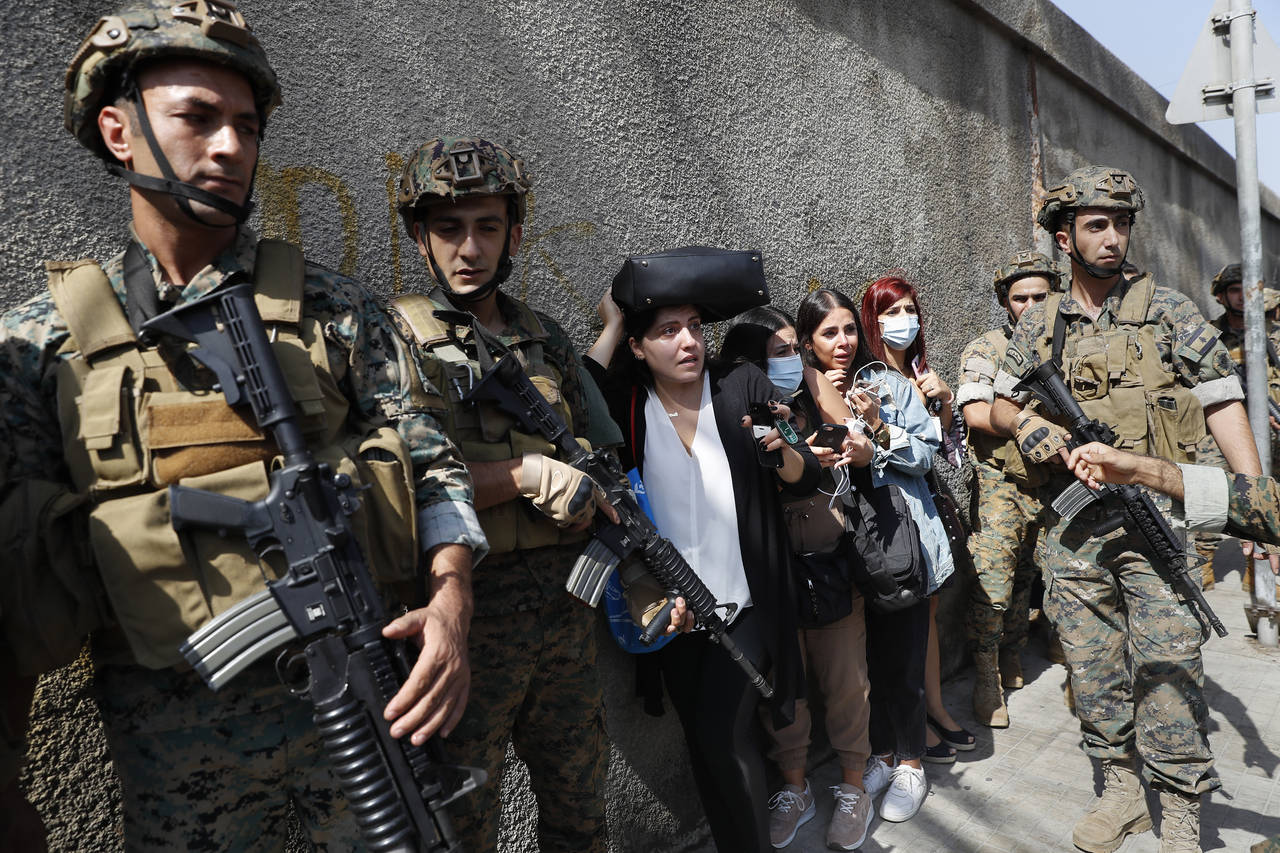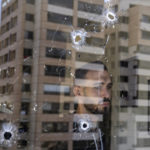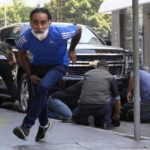Beirut clash fires up sectarian anger in echo of civil war
Oct 19, 2021, 11:13 AM | Updated: Oct 20, 2021, 2:15 am

FILE - In this Oct. 14, 2021, file photo, Lebanese teachers react to the sounds from nearby armed clashes as they flee their school under the protection of Lebanese soldiers after a clashes erupted along a former 1975-90 civil war front-line between Muslim Shiite and Christian areas at Ain el-Rumaneh neighborhood, in Beirut, Lebanon. The shootout on the streets of Beirut between rival Christian and Muslim groups has revived memories of the country's 1975-90 civil war and fired up sectarian passions in a country that never dealt with the causes of its violent past. (AP Photo/Hussein Malla, File)
(AP Photo/Hussein Malla, File)
BEIRUT (AP) — He was only a year old when his panicked father picked him up and they fled with his mother from the gunfire rattling their neighborhood. It was the day Lebanon’s civil war started 46 years ago. His family’s apartment building in Beirut was on the frontline.
Now 47, Bahij Dana did the same thing last week. He evacuated his wife and two of his kids as gun battles raged for hours outside the same building. Civil defense rescuers came to help his father and mother, stuck in the lower floors.
“History is repeating itself,” Dana said.
The battle Thursday went on for five hours between supporters of Lebanon’s two powerful Shiite factions and gunmen believed to be supporters of a Christian party. It took place on the line between Beirut’s Chiyah and Ain el-Rumaneh neighborhoods, the same notorious frontline that bisected the capital into warring sections during the country’s dark civil war era.
It was not just memories of the war that were triggered by the scenes of gunmen in streets and schoolchildren ducking under desks. The battles, which left seven dead, also fired up the sectarian passions from that violent past, which Lebanese had learned to brush aside without ever dealing with the causes.
Add to that a bankrupt government, hyperinflation and mounting poverty, and the country of six million is turning into a powder keg on the Mediterranean.
The clashes erupted over the probe into last year’s massive port blast, as the political elite closed ranks in their efforts to block it.
Despite calls for calm, leaders of Shiite Hezbollah and the rival right-wing Christian Lebanese Forces kept up their heated rhetoric. They brought back civil war jargon, talking about “frontlines” and “neighborhood defenses,” deepening the sense that the pact that kept the social peace since the war has come undone.
“We made up, and now they want to pit us against one another again,” said Camille Hobeika, a 51-year-old mechanic and Christian resident of Ain el-Rumaneh.
Since the war, the sectarian-based warlords who fought it have divvied up political power, signing a pact in 1989 and issuing an amnesty for themselves. Though rivals, they have had a common interest in maintaining the system, rife with patronage and corruption, and so generally keep a shaky peace.
The new fighting highlighted a generational divide that stands at the heart of how Lebanese deal with that legacy.
For those who lived through the atrocities of the communal fighting between 1975 and 1990, the country is fated to that system, even with occasional bouts of violence whenever the entrenched political leadership looks to recalibrate the balance of power.
Dana sees the burst of violence as a tried tactic by the leaders: When they face trouble, they stoke fear of civil war, so each sect’s followers rally around their chief, seeing him as their only protection.
For him, this is how things work, rooted in the “zaim,” Arabic for leader, who provides his community with jobs and services in return for his supporters’ unquestioning loyalty.
“We are used to it. We were brought up in a war environment,” Dana said. “We are not accepting war. But I accept my country, my cedar tree, my family and friends. Where else can I find that?”
But many in the younger generation say they refuse to be pawns of the political elite. They tried protesting, with nationwide rallies in 2019, but hardly shook the foundations of the ruling class.
Dana’s 22-year-old daughter, Vanda, a university student, sees nothing to gain from the leadership and no point in staying in Lebanon.
In the last three years, Lebanon has lost its status as a middle-income country, with over 70% of the population sinking into poverty, and many skilled professionals leaving. Her father’s 25-year-old printing business has gone to ruins and the family money is locked in the bank, inaccessible because of restrictions imposed during the financial meltdown.
Now, her bedroom windows are riddled with bullets.
“We learned and attended the best universities, only to experience this! Why? Why do I now have to be terrified when a door slams? Why do I have to run to my father crying when there is any sound? I don’t have to live this life,” she said, sobbing.
“My parents say they still have hope. But there is nothing left,” the younger Dana said. “Why should I plan a family here and make them go through this? In 10 or 20 years, the same thing will happen. It will always stay this way.”
Some pin hopes on next spring’s parliamentary elections as a way out of the leadership’s grip. But Lebanon’s politics are mostly sectarian. Parties’ supporters are predominantly from the same sect, and election districts are gerrymandered to fit sectarian lines.
Days after the clashes, many residents of the area have yet to return home. Apartment buildings freshly pockmarked by bullets line the streets.
Army vehicles and barbed wire separate predominantly Christian Ain el-Rumaneh and mainly Shiite Muslim Chiyah — bringing back the image of a West Beirut and an East Beirut, a split Lebanese have shunned since the war.
In Chiyah, the neighborhood is in mourning. All those killed were supporters of the Shiite groups Hezbollah and Amal. Posters for a mother of five killed on her balcony from flying bullets hang between buildings.
“Hezbollah has always been targeted,” said Chiyah resident Ali Haidar, 23.
With the sectarian violence, each sect brings out its stored-up resentments against the other, imagined or real.
Haidar said Hezbollah defended Lebanon against Israel and terrorism only to be met with hostility from internal foes like the Lebanese Forces. When Israel was bombing his neighborhood and other Hezbollah areas in 2006, he said, “life was normal on the other side.”
On the other side in Ain el-Rumaneh, electronics store owner Sami Nakkad blamed the Shiites for Thursday’s violence. Bullets from Chiyah landed in his apartment above the store. He insisted Ain el-Rumaneh residents, defending their area, carried only sticks.
Asked how he explained the deaths on the other side, Nakkad said: “They killed themselves because they want to twist things around.”
During Thursday’s gunbattles, Nakkad, who is in his 70s, hid with his wife and daughter for hours in a stairwell.
His employee, 45-year-old Shadi Nicola, left when the bullets started flying, seeing no use in the fight. He called the clashes “theatrics” by leaders losing popularity amid a crushing economic crisis.
“Elections will bring them back. Those people… came through blood. They will only go with blood,” he said.
Elie, a 28-year-old trainer, has slept at friends’ homes away from the neighborhood since the clashes. He has an upcoming interview for a job abroad and is ready to leave Lebanon.
“This (fighting) is not our decision,” he said. The country is slipping into trouble, and the leaders “are not even making a 1% effort to fix things. They are taking us deeper.”
Copyright © The Associated Press. All rights reserved. This material may not be published, broadcast, rewritten or redistributed.
























